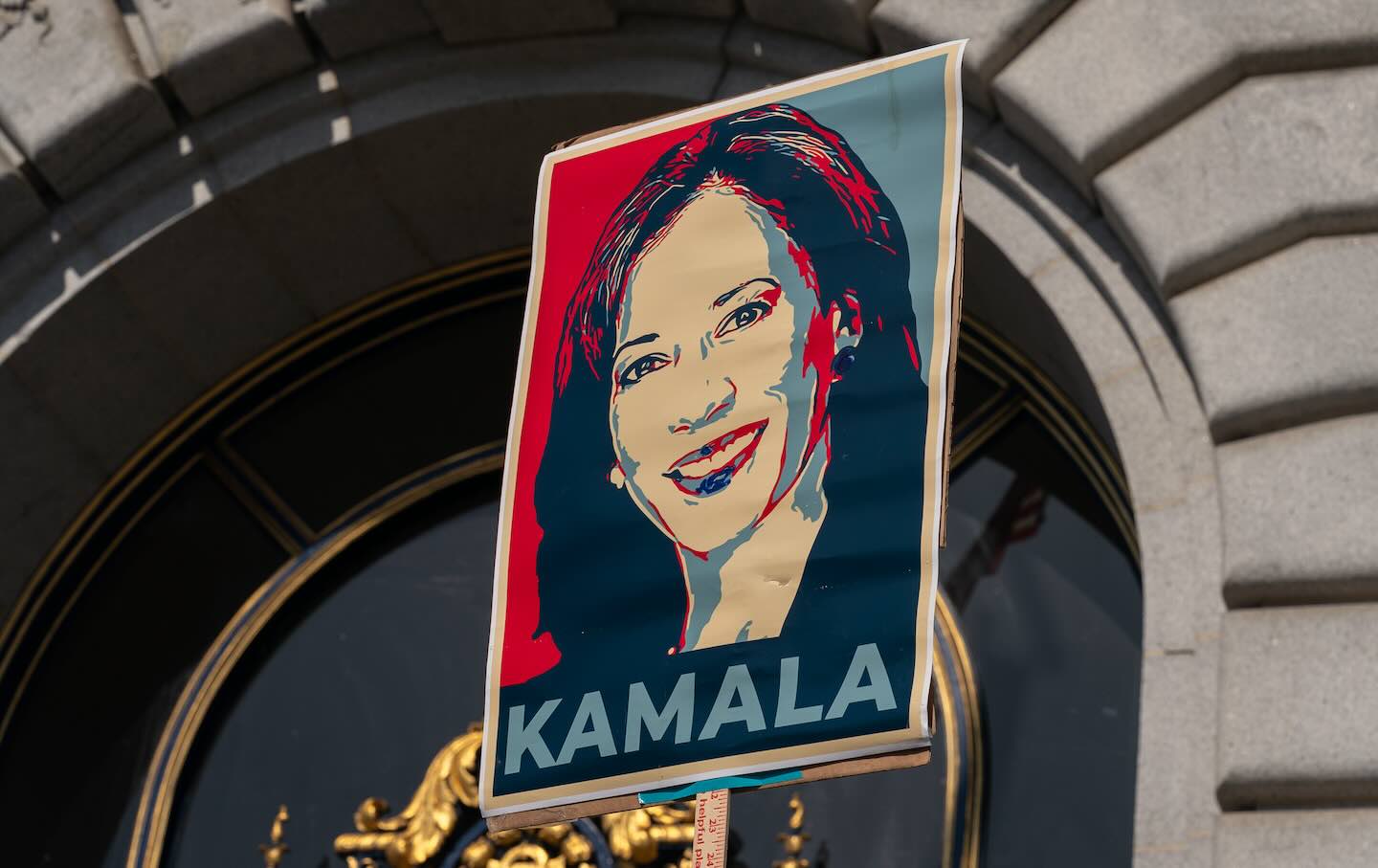
Wealthy centrists are already pressuring Democrats to give up their progressive achievements.
Kamala Harris has replaced Joe Biden as the presumptive Democratic nominee in a remarkably smooth fashion. Shortly after he announced that he was withdrawing as a presidential candidate on Sunday, July 21, Biden endorsed Vice President Harris to succeed him. The Democratic Party quickly coalesced around Harris, with scores of major elected officials and party elders echoing the endorsement within hours. By the following day, a majority of pledged delegates to the Democratic convention had endorsed Harris and her campaign was setting fundraising records.
Prior to Biden’s withdrawal, one of the stronger arguments for his staying on was that the process of selecting a new nominee in the few weeks before the Democratic convention could produce chaos. That fear proved unfounded with the quick acceptance of Harris by Democrats.
The quick ascension of Harris is indeed an impressive display of party unity. But Democrats remain divided behind the scenes, with very wealthy donors clearly trying to use the uncertainty of the current moment to flex their power. Before Biden’s withdrawal, wealthy donors such as Florida lawyer John Morgan were among the loudest voices in the party in their calls for an open primary in the Democratic National Convention because they disliked the prospect of Harris as the nominee, seeing her as too liberal and unprepared for a national campaign.
Now that Harris is very close to a done deal, some wealthy donors are trying to pressure her and the Democrats at large to abandon some of Joe Biden’s economic populism, particularly in the areas of antitrust regulation and the regulation of cryptocurrency.
As Reuters reported on Friday, “Billionaire Democratic donors Barry Diller and Reid Hoffman said in interviews this week they hope Kamala Harris will replace Federal Trade Commission [FTC] Chair Lina Khan if she becomes U.S. president, openly rejecting a pillar of President Joe Biden’s antitrust policy.” In her tenure as FTC Chair, Khan has been among the most effective and polarizing Biden appointees, using long-standing but neglected laws to go after corporate monopolies, earning along the way the enmity of Wall Street and Silicon Valley.
The following day, the Financial Times suggested that this new attitude of aversion to regulating big business was finding adherents in Harris’s inner circle, reporting that “Kamala Harris’s advisers have approached top crypto companies to ‘reset’ relations between her Democratic party and a sector that has come out as an important backer of Donald Trump, her rival for the US presidency.” The newspaper added, “People advising the Harris campaign on business matters said the decision to reconnect with the crypto industry had little to do with attracting new electoral contributions. They said the objective was instead to build a constructive relationship that would ultimately set a smart regulatory framework that would help the growth of the entire asset class.”
Current Issue

On Friday, 14 Democratic members of the House of Representatives signed a letter calling for a friendlier regulatory approach to cryptocurrency. Most of the lawmakers were centrists, but one signer was the progressive Ro Khanna of California, who of course represents a district rich in tech money.
This new push against antitrust action and regulating cryptocurrency represents a reversal of hard-won gains under Joe Biden that had been achieved due to the activism of progressives such as Senator Elizabeth Warren; it is also a politically risky move that threatens to blur the distinction between Democrats and Republicans.
Democrats already have egg on their faces from their earlier willingness to take money from a major figure in the world of cryptocurrency who turned out to be a fraud: the now-convicted Sam Bankman-Fried (whose cryptocurrency exchange FTX went bankrupt in 2022 and turned out to have engaged in massive scam). The only saving grace of the Bankman-Fried fiasco was that it turned out he had covertly donated to Republicans while also being a big bankroller of the Democratic Party.
As with Bankman-Fried, the current surge of political support for cryptocurrency is turning out to be a bipartisan affair—indeed, even transpartisan, since independent candidate Robert F. Kennedy Jr. is also in on the game. Over the last few days both Kennedy and Republican nominee Donald Trump lavished praise on cryptocurrency at a Bitcoin conference in Nashville. In the past, when he was president, Trump had been a crypto skeptic, describing Bitcoin as a “scam” and a “disaster waiting to happen.”
Speaking in Nashville, Trump had become a born-again crypto superfan, saying he wanted the United States to be “the crypto capital of the world.” He endorsed a scheme to create a Bitcoin “strategic reserve.” This is a plan that would help bolster the speculative currency but makes no economic sense. The United States already has a currency and there is no reason to fear a Bitcoin shortage. Trump also added, “We will have regulations, but from now on the rules will be written by people who love your industry, not hate your industry.” This is in effect the same position some wealthy Democratic donors want Harris to adopt.
Trump also promised to commute the sentence of jailed tech boss Ross Ulbricht, a martyr in the crypto world. AP reports, “Ulbricht created the underground drug-selling website Silk Road but was sentenced to life in prison after a judge held him responsible for six overdose deaths linked to his website. Some of the nearly 800 attendees who flocked to downtown Nashville to hear Trump speak wore ‘Free Ross Day One’ hats, in a nod to Ulbricht’s prison sentence.”
If the Democrats were smart, they’re realize how vulnerable Trump is on these issues that give the lie to his claim to be a populist. The FTX meltdown of 2022 already shows how unregulated tech can harm ordinary investors. Letting the crypto gamblers set the rules for their own casino is a sure path to future economic crashes. Further, a figure like Ulbricht embodies lawless capitalism at its worst. Trump could easily be attacked on these issues, but only if Democrats themselves avoid becoming crypto shills.
Polls show that antitrust laws are very popular, having the support of more than two-thirds of Americans. Similarly, most Americans are wary of cryptocurrency. “Among the vast majority of Americans who say they have heard at least a little about cryptocurrency (88%),” a Pew poll in 2023 found that “three-quarters say they are not confident that current ways to invest in, trade or use cryptocurrencies are reliable and safe.”
Popular
“swipe left below to view more authors”Swipe →
In other words, the antitrust and pro-regulation position that was championed by progressives such as Elizabeth Warren and taken up by Joe Biden are very popular. Kamala Harris needs to reject the bad advice she’s getting from wealthy donors. In the current war within the party, she could also be bolstered by Bernie Sanders and Warren’s taking center stage to pressure her to remain true to economic progressivism (a role Sanders seems to have already adopted).
Democratic politicians are often encouraged to engineer a “Sister Souljah moment”—to attack portions of their left-wing base for allegedly extreme positions (named for Bill Clinton’s lambasting the civil rights activist and rapper Sister Souljah in 1992). The idea is to earn centrist clout by going after easy targets—people who have no alternative but to vote for the Democrats. But in the current moment, the smartest Sister Souljah moment Harris could pull off would be to denounce the centrist plutocrats who are giving her money but also trying to hijack the party. Harris is very well positioned to assert her independence right now, because she’s setting fundraising records with a surge of support from small donors. In other words, she can well afford to offend a few big donors who would make very convenient foils. If Harris denounces these false friends, she’ll solidify her path to victory.
Thank you for reading The Nation
We hope you enjoyed the story you just read, just one of the many incisive, deeply-reported articles we publish daily. Now more than ever, we need fearless journalism that shifts the needle on important issues, uncovers malfeasance and corruption, and uplifts voices and perspectives that often go unheard in mainstream media.
Throughout this critical election year and a time of media austerity and renewed campus activism and rising labor organizing, independent journalism that gets to the heart of the matter is more critical than ever before. Donate right now and help us hold the powerful accountable, shine a light on issues that would otherwise be swept under the rug, and build a more just and equitable future.
For nearly 160 years, The Nation has stood for truth, justice, and moral clarity. As a reader-supported publication, we are not beholden to the whims of advertisers or a corporate owner. But it does take financial resources to report on stories that may take weeks or months to properly investigate, thoroughly edit and fact-check articles, and get our stories into the hands of readers.
Donate today and stand with us for a better future. Thank you for being a supporter of independent journalism.
More from The Nation

In When The Clock Broke, John Ganz offers a whirlwind tour of the cranks, conservatives, and con artists who helped remake the American right at the turn of the 21st century.
Books & the Arts
/
David Klion

The nomination gives the presumptive Democratic presidential nominee a second ballot line in New York and a big organizational boost from WFP and its allies.
John Nichols

Patriarchy, plutocracy, and ethnonationalism fuel the vice-presidential candidate’s bizarre slur.
Jeet Heer